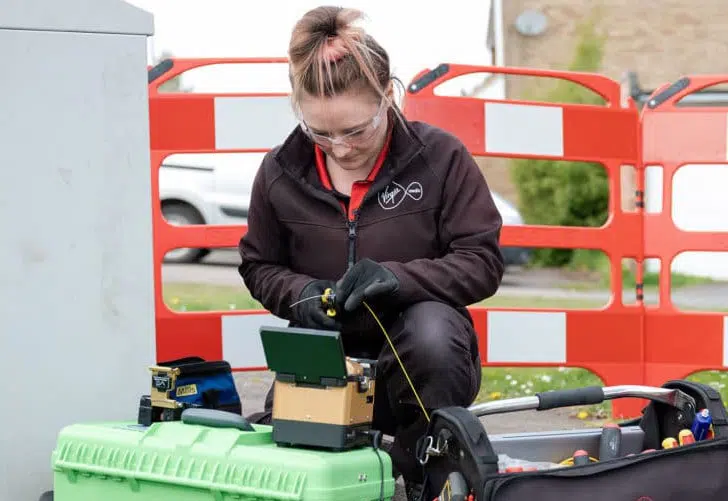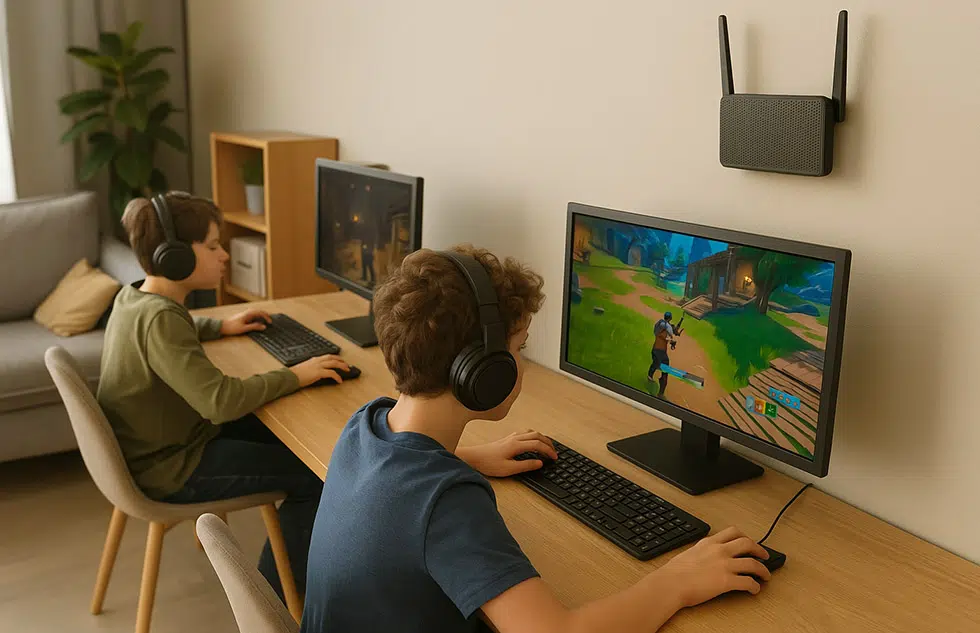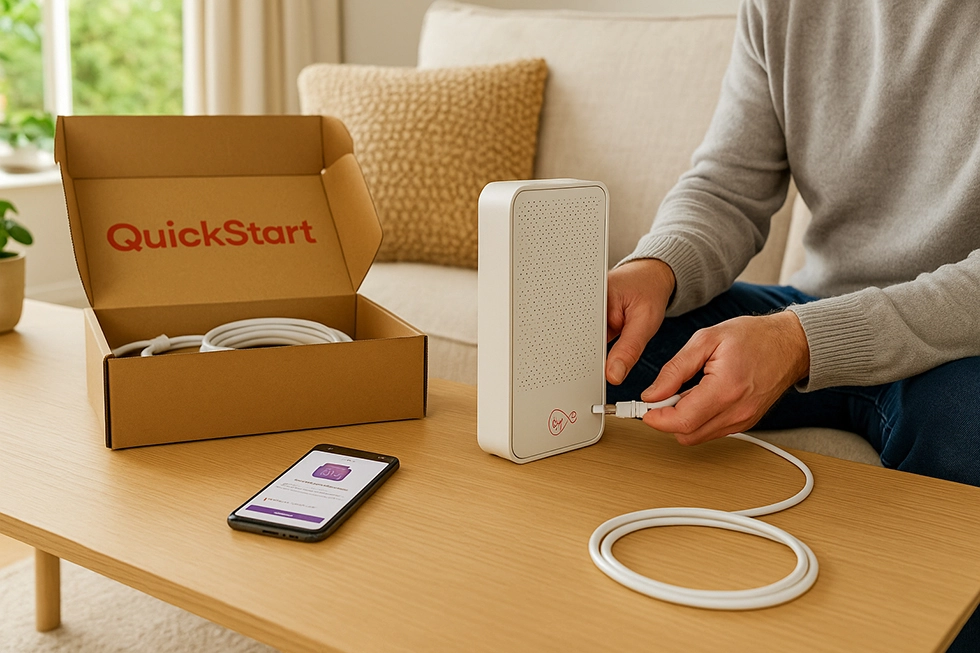Is Virgin Media broadband good for gaming?
Virgin Media is one of the biggest broadband providers in the UK. It offers gigabit speeds to more homes than any other provider.
That makes it a popular pick if you want downloads to finish quickly. But gaming is different.
For smooth online play, you don’t need massive speeds. You need low latency, steady ping, and no packet loss. So the question is: is Virgin Media actually good for gaming?

Speed vs latency
Speed doesn’t decide how your game feels. Online play only needs a few megabits of bandwidth. What matters is latency — the delay between pressing a button and seeing the result on screen.
Virgin Media’s strength is fast downloads. If you’re pulling a 100GB game or a big patch, Gig1 or Gig2 will handle it faster than most rivals. That’s great for convenience.
Latency is trickier. Virgin uses cable for most connections, not full fibre. That means ping can change depending on how busy your local area is. Some users see smooth 20–30ms ping. Others get spikes that push well over 60ms. That can ruin competitive play.
Best Virgin Media Broadband Plans for Online Gaming
If you’re choosing Virgin Media for gaming, the difference between plans isn’t about ping (latency is broadly similar across tiers) but about how much download capacity you have to handle updates, patches and household traffic at the same time. Here are the best options explained.
Gig1 (1Gbps)
This is the most suitable plan for gaming households. With up to 1Gbps download and around 100Mbps upload, it gives enough bandwidth for large game patches to download quickly without affecting in-game latency. It’s also a good option if you have multiple consoles, PCs or streaming devices in use at the same time.
Gig2 (2Gbps, selected areas)
Virgin’s fastest package. At 2Gbps, download times for new releases and 4K streams are cut further, and upload speeds reach around 200Mbps. It doesn’t lower ping compared to Gig1, but it provides more throughput for homes with heavy simultaneous use, including gamers, streamers and remote workers.
M500 (516Mbps average download, 52Mbps upload)
M500 is strong value for gaming if you don’t need gigabit speeds. Updates and patches remain quick, and upload capacity is enough for online play and light streaming. Latency performance is the same as higher tiers, so you don’t lose gaming responsiveness.
M350 (362Mbps average download, 36Mbps upload)
M350 can handle online gaming smoothly as latency doesn’t depend on speed. Downloading large files will take longer than M500 or Gig1, but for most players the connection is fast enough to play without interruption.
M250 (264Mbps average download, 25Mbps upload)
This plan is still more than enough for gaming, as online matches only require a few megabits per second. The lower upload rate means it’s less suited to streaming your gameplay or backing up large files while playing, but for everyday gaming it remains viable.
Is Virgin Media broadband any good for gaming?
Virgin Media has a gaming advice section. It talks about latency, tells you to keep your router updated, and suggests leaving spare bandwidth so the connection doesn’t slow down when the house is busy. They also point to O2 gaming perks like early access to betas.
It’s helpful, but it doesn’t answer the key question: what’s ping actually like where you live?
Independent tests and gamer feedback give a mixed picture.
- Download speeds are fast, even at peak times.
- Latency is less consistent. It can be fine in some areas and unpredictable in others.
- Packet loss sometimes shows up, and when it does you’ll see lag spikes or rubber-banding.
Compare that with full fibre broadband. Providers like BT, Sky, Plusnet, Community Fibre and Hyperoptic usually offer lower and more consistent ping. That’s because fibre is less affected by congestion and electrical noise.
Virgin doesn’t have more outages than other providers, but when something goes wrong it often affects large regions. For gaming, even a short outage is frustrating. Regional congestion is also a common complaint. If your area is affected, fixes can take time.
Gamer feedback
Look at forums or Reddit threads and you’ll spot patterns.
- Many players who switched from Virgin to full fibre report lower ping and fewer spikes.
- Performance varies by street. One area can be great, the next can be full of jitter.
- Experienced users often put Virgin’s Hub 5 into modem-only mode. They then use a separate gaming router with SQM or QoS. This lets you prioritise gaming traffic and keep ping low when others are downloading.
So Virgin can be fine for gaming — if your local area is strong and you set up your network properly.
If you want to know whether Virgin is good for gaming at your address, run a Broadband Quality Monitor test. Thinkbroadband’s tool shows latency and packet loss in real time.
- A flat line with no spikes means smooth gaming.
- Frequent spikes or loss mean problems.
Lots of Virgin customers share these graphs online. It’s a good way to compare your results.
Hub 5 vs Hub 5x
Virgin’s latest routers make a difference.
- The Hub 5, used on cable, supports modem-only mode. That means you can use your own router and control traffic better.
- The Hub 5x, used on Virgin’s new full fibre service, doesn’t usually allow modem-only mode yet. That limits your options if you want a specialist gaming router.
For serious players who want control, the Hub 5 is easier to work with.
Verdict
Virgin Media can be good for gaming. But it’s very dependent on your postcode and your setup.
It’s a decent choice if:
- Full fibre isn’t available where you live.
- You want the fastest downloads for big games.
- You’re using a Hub 5 in modem-only mode with a gaming router.
It’s not ideal if:
- You can get full fibre from another provider.
- Your area has jitter or packet loss Virgin can’t resolve.
In short: Virgin Media is excellent for download speeds, but consistency for gaming is hit and miss. If your priority is smooth ping, full fibre is usually the safer bet.

